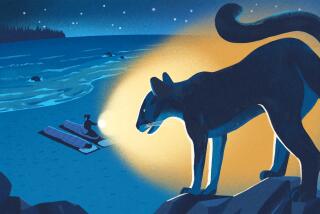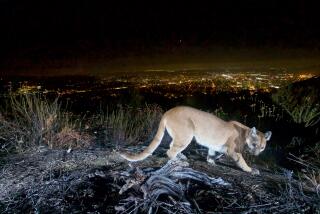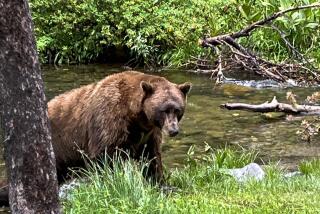Trackers Slay Cougar Suspected of Killing Jogger
The trackers were up and out at sunup again on Sunday, combing the rugged terrain for any signs of the big cat that had killed the woman.
It had been like this for a week, ever since the body of Barbara Schoener was found near the Sierra foothills trail where she had been jogging. She had been attacked repeatedly before her body was dragged 100 feet downhill to a spot near a tree. And in the manner of mountain lions, her body had been covered with leaves and other debris to hide a wild animalâs cache.
On Sunday, almost exactly a week from the time the 40-year-old womanâs body was found, trackers searching the soft forest soil for clues saw what they had been looking for--a fresh paw print in dirt that had been raked clean the day before. Then, farther on, the fresh scat of a mountain lion.
The hounds picked up the trail and two were released to follow the scent, baying as they ran through the woods. Within 15 minutes, and only a quarter-mile away, the dogs treed the mountain lion.
The trackers did not shoot the big cat immediately, but waited for others with more experience to arrive. It had been agreed in advance that the mountain lion had to fit the profile of the one that had killed Schoener--two to three years old and of medium weight.
âWe didnât want to go out there and shoot just any cat,â said Ryan Broddrick, the regional manager for the state Department of Fish and Game. âWe didnât relish having to kill a mountain lion.â
In the end, an animal damage control officer of the U.S. Department of Agriculture--a man who did not want his name used because of past death threats over what he does for a living--fired the single bullet that brought down the mountain lion from its perch.
In doing so, he may have ended a weeklong drama in the tiny community of Cool.
All of it began so casually, with Schoener driving the 30 familiar miles to Auburn Lakes Trails on the morning of April 23 to run and, by doing so, unwind. She was a vocational rehabilitation counselor, and she often ran the trails above Cool to relieve the stress of a demanding job.
She was also a marathon runner, a serious athlete who ran as far as 10 miles a day. And she was the mother of two small children.
Why the mountain lion attacked her is a matter of conjecture. But what investigators believe is that it struck from behind, and that Schoener, her balance upset by the force of the blow, went down a steep slope. Then the lion pounced again.
According to investigators who examined the body, the womanâs skull was crushed and her neck bitten. A number of claw marks made it apparent she had struggled.
When Schoener did not come home by Saturday night, her husband, Pete, called police to report her missing. They found her body about 7:30 the next morning.
From then on, the searches began at dawn and ended at dusk while a sense of uneasiness fell over Cool. These people who had coexisted with mountain lions because the danger to humans seemed so small began making sure that their children were within sight and that their pets were brought in at night.
All week, the trackers--three teams of two men each--kept looking for signs of the cat. What they feared was that the mountain lion, having discovered that humans were easy prey, would attack again.
Trackers covered the area with hounds. They raked the trails they had already covered so they could be checked the next day for signs of a paw print.
On Thursday, two local men driving a four-wheel-drive pickup shot a mountain lion, crippling it. Trackers had to hunt the wounded animal and kill it. The men have not been found, but Broddrick cited it as an example of how people are viewing mountain lions.
âWe wanted to avoid a situation where it became open season on mountain lions because of fear by people,â he said.
Finally came the Sunday morning breakthrough with the paw print in the path--ironically only a short distance from where Schoenerâs body had been found.
The dead mountain lionâs paws were put in paper bags before the body was taken to the UC Davis School of Veterinary Medicine. There, it will be examined by a team of veterinary pathologists, members of the Sacramento County coronerâs office and Fish and Game pathologists.
They plan a full analysis of the mountain lionâs digestive system, and its paws, claws and teeth for any evidence that this was the animal that killed Barbara Schoener.
Broddrick said Sunday that the marks on Schoenerâs body appear to match the dead catâs teeth; a specialist in dental work will conduct a full comparison.
Late Sunday afternoon, Pete Schoener was asked about the death of the cat. He said he would rather not talk about the lionâs killing--as if to say it was irrelevant after what had happened to him and his children.
âIf you want to talk about what a good person she was, I will,â he said. âBut that is all.â
More to Read
Sign up for Essential California
The most important California stories and recommendations in your inbox every morning.
You may occasionally receive promotional content from the Los Angeles Times.










